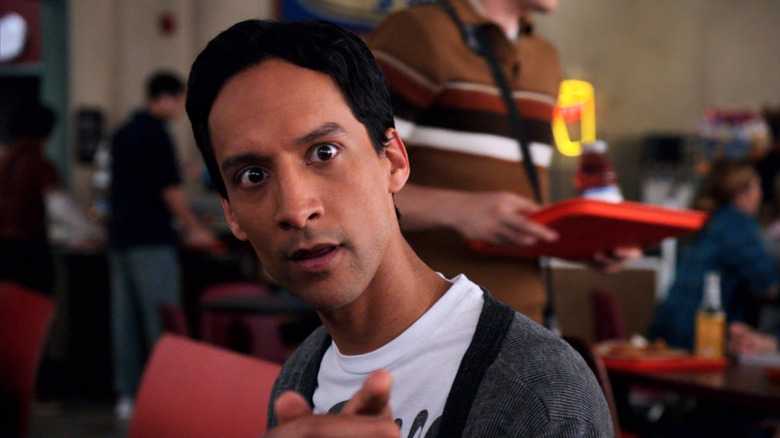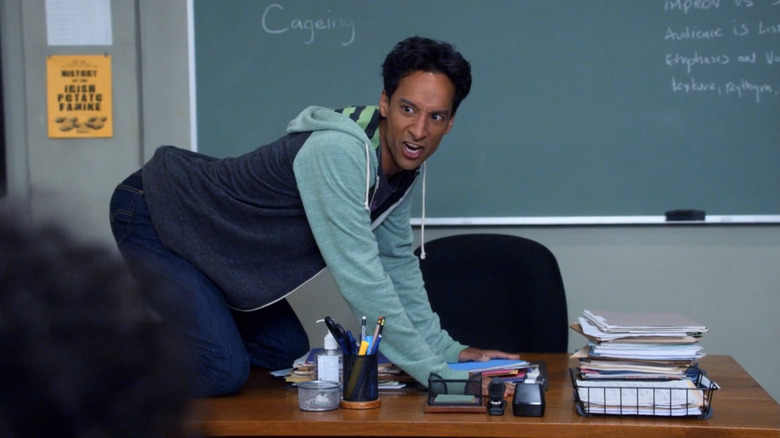Dan Harmon Credits Community's Success To One Fan-Favorite Character
When one thinks of the greatest sitcoms in television history, there is one element that likely first comes to mind: the comedy. A sitcom without the "com" is just a situation. But great jokes alone aren't enough either. Simply placing gags within a narrative isn't going to get viewers coming back each week. To create a successful sitcom, you need to get the audience invested in the characters, people they'll want to watch get into new hijinks episode after episode. A show like "Community" is successful on both counts.
Each member of the "Greendale 7," as the core cast of characters are affectionately called, has a sharply-defined personality which allows the actor portraying them to showcase the best of their comedic abilities. The setup of the show harkens back to a classic sitcom formula, a group of misfits forced together for one reason or another who become something of a found family. Think "Cheers," "The Mary Tyler Moore Show," "Friends," you name it. What separates "Community" from these shows is that they're all about the comfort of the "familiar." If you watch an episode of "Cheers," you basically know the beats of what's going to happen and when. "Community," on the other hand, constantly pushes itself in content, form, and style, usually through genre homages.
Building characters that fit within the traditional sitcom framework but also adapt to whatever stylistic deviance the writers decide to throw at them is enormously challenging and poses the risk of alienating viewers. But creator Dan Harmon crafted the perfect character to help bridge that divide, someone constantly straddling the reality and the meta of "Community." That is the character of Abed.
Lowering the audience's defenses
Abed Nadir, beautifully played by Danny Pudi, is a neurodivergent film student at Greendale Community College who views the world as if it were a television show. He is someone who lacks social awareness and the ability to read emotions, so imaging his life as a show gives him some sense of structure to help him get through the day.
Through Abed, Dan Harmon and his room of writers can self-reflexively talk about what it means to be a sitcom. The sitcom has been a reliable form of entertainment for decades, and it's used as a comfort blanket from the real world by millions of people. Abed is one of those millions. He is a person who needs that blanket at all times because his view of the world is chaotic and confusing. The character is not used as an excuse for jokes, but as a means to dig far deeper than the traditional sitcom format normally allows. The writers are able to mine endless amounts of meta-humor from him as well, as he is frequently used as the springboard to explore various genres. Speaking with The Independent in 2020, Harmon discussed how vital Abed has been to the overall success of "Community":
"I credit it to the engineering of Abed. There's a very valuable sitcom-saving ventilator tube with that character. Every primate wants that sense of family and comfort but you're nagged by this very healthy scepticism because TV feels like a lie. Simply having Abed there to say every few moments 'this sure feels like we're on a TV show' –- I always looked at that as making the fourth wall digestible to a millennial audience so they could lower their defences and fall in love with the show."
In praise of Danny Pudi
Very stupidly, "Community" never received a single Emmy nomination for any of its cast members over its six seasons. The biggest crime I see there was never properly rewarding Danny Pudi for his work as Abed. The decision to portray neurodivergent characters too often ends in complete disaster — especially in comedy. They can quickly become offensive caricatures if the proper amount of work isn't put into them. It is even more challenging when the specificity of divergence is undefined.
Danny Pudi elegantly sidestepped the potential pitfalls of portraying Abed with grace. He created a character with a consistent and understandable way of thinking and behaving that the show never judges him for. He manages to be earnest without being cloying, a key element to the success of "Community." But he doesn't make him a saint either. Pudi lets Abed be overly aggressive and judgmental at times, constantly learning about boundaries and how to read certain situations. He understands the full humanity of Abed and how he would behave in any situation, whether his pop culture-fueled dalliances are indulged or not.
Also, he is just damn funny. Whether he's goofing off with Donald Glover's Troy or taking on the persona of Han Solo in a paintball war, Pudi's comedic timing remains impeccable. He attacks his frequent patter-filled monologues with a precise rhythm that always makes me guffaw. His physicality matches the specificity of language as well, particularly in how he uses his hands. His rail-thin frame works as both a punchline and a source of empathy.
Though Abed isn't the lead of "Community," he is its center. Everything that people love about "Community" emanates from him. The style, the humor, the pathos. Though Dan Harmon deserves to be celebrated for Abed, Danny Pudi deserves a great deal more credit.


